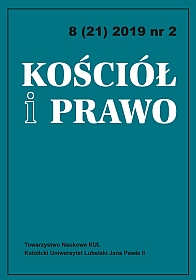Education of Members of Religious Institutes in Poland
Abstract
The right to educate members of religious institutes is guaranteed both by the legislation of the Republic of Poland and by the canon law of the Catholic Church. The need for education lies in the person as a person and leads to the person’s identity integration. The professions and clergy with this can serve God and the Church as a concrete charism for each institute. The 1983 Code of Canon Law and the documents of the Second Vatican Council mandates the extension of spiritual, apostolic, doctrinal and pastoral formation to all consecrated persons, because until now such a broad formation was reserved mainly for clerics and religious of the so-called the “first choir”. The new Ratio fundamentalis institutionis sacerdotalis of 2016 titled “The Gift of the Priestly Vocation” is of great importance for the formation of the clergy. For this reason the bishop’s conferences and the clerical religious institutes are to develop their own detailed provisions on priestly formation. The significant feature of formation is spiritual, human and fraternal dimension of formation. It is also important to discover charism that holds together all the previously mentioned characteristics of the formation of candidates for the priesthood.
References
Bartczak, Adam. 2014. „Duchowny.” W Wielka Encyklopedia Prawa. T. 2: Prawo kanoniczne, red. Grzegorz Leszczyński, 60. Warszawa: Fundacja „Ubi societas, ibi ius”.
Mezglewski, Artur, Henryk Misztal, i Piotr Stanisz. 2011. Prawo wyznaniowe. Warszawa: Wydawnictwo C.H. Beck.
Ożóg, Kazimierz. 2014. „Spotkanie nad morzem: początek i rozkwit legendy o świętym Augustynie w sztuce europejskiej.” Studia Teologiczno-Historyczne Śląska Opolskiego 34:285-97.
Skorupa, Ambroży. 2002. Słuszna autonomia instytutów zakonnych w Kościele łacińskim. Kraków: Wydawnictwo Salwator.
Copyright (c) 2019 Kościół i Prawo

This work is licensed under a Creative Commons Attribution-NonCommercial-NoDerivatives 4.0 International License.





